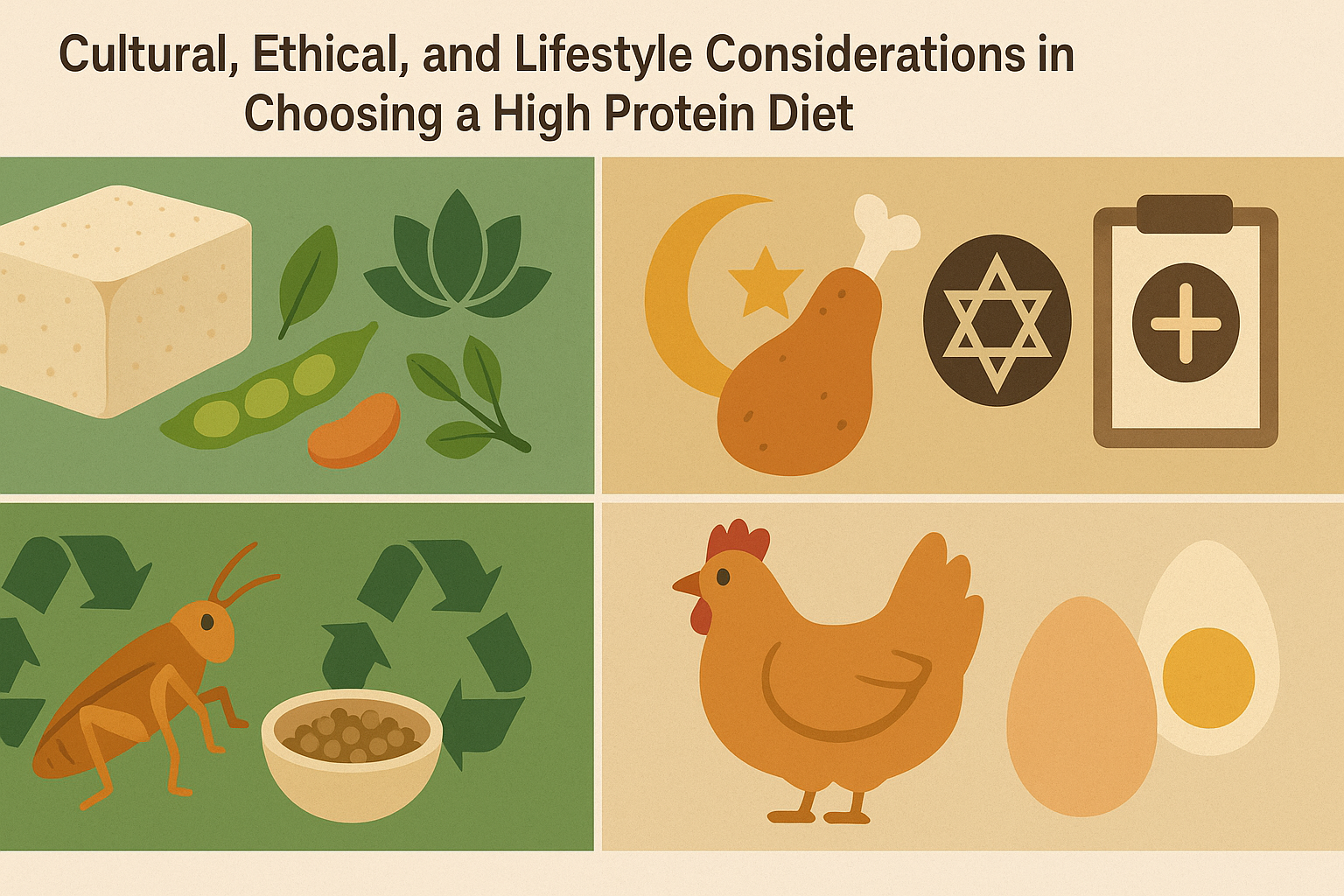In the world of nutrition and wellness, selecting the right high protein diet name is more than a branding exercise; it can shape your mindset, goals, and even long-term adherence to healthier eating patterns. As high-protein diets continue to dominate headlines and health conversations, the importance of choosing a plan with a name that resonates with your individual objectives has become increasingly evident. Whether you are aiming for muscle gain, weight loss, metabolic health, or enhanced athletic performance, the right high protein diet name can serve as a psychological anchor and motivational tool. This guide provides a comprehensive roadmap for selecting a diet name that is scientifically sound, personally relevant, and SEO-friendly—particularly valuable if you are a health coach, content creator, or just someone looking to stay on track with your dietary goals.
You may also like : Best Vitamins for Erectile Strength: Natural Supplements to Support Harder, Longer-Lasting Erections
Understanding the High Protein Diet Definition: What It Really Means
Before diving into how to name a diet, it is essential to clarify the high protein diet definition. At its core, a high-protein diet is one in which a larger-than-usual percentage of daily caloric intake comes from protein sources. Typically, a standard diet consists of approximately 10-15% protein, whereas a high-protein regimen can raise this range to 25-35% or more, depending on individual needs and health goals. The primary aim is to utilize protein’s metabolic advantages—such as increased satiety, thermogenesis, and muscle preservation—to promote healthier body composition.
Protein is one of the three primary macronutrients, alongside carbohydrates and fats. However, unlike carbohydrates and fats, protein plays a crucial role in muscle synthesis, hormonal balance, immune function, and tissue repair. People who follow a high-protein eating plan often report improved energy levels, better appetite control, and enhanced recovery from physical activity. That said, not all high-protein diets are created equal, and not all are suitable for every individual. This is where the importance of understanding and selecting the right high protein diet name comes into play.

Why Your High Protein Diet Name Matters More Than You Think
Names carry emotional weight. From products to lifestyle movements, the labels we assign can significantly influence perception and motivation. A high protein diet name is not merely a label; it becomes part of your identity and the narrative you tell yourself and others about your health journey. Think about widely recognized names like “The Atkins Diet,” “The Paleo Diet,” or “The Zone Diet.” These names aren’t just catchy; they communicate core principles, evoke a lifestyle, and foster community.
When you assign a name to your diet, you subconsciously elevate its importance. It shifts from being an arbitrary set of food choices to a formalized commitment. For individuals trying to achieve specific health outcomes, this can be a game-changer. Moreover, if you’re sharing your journey on social media or maintaining a health blog, the name of your diet becomes a searchable keyword. This enhances not only accountability but also visibility, which can inspire others and create a ripple effect of positive behavior.

Aligning Your High Protein Diet Name with Your Personal Goals
Choosing the perfect high protein diet name begins with clarity. You need to determine what you want your diet to accomplish. Are you looking to build muscle mass, enhance endurance, lose body fat, stabilize blood sugar, or support healthy aging? Your goals will help determine both the tone and structure of your diet name. For instance, someone interested in bodybuilding might gravitate toward names like “Power Protein Protocol” or “Muscle Macro Plan,” while an individual focused on metabolic health may prefer something like “The Glucose Guardian Diet” or “Insulin-Smart Protein Plan.”
It’s also important to consider your psychological profile. Are you more inspired by scientific authority or emotional connection? Names that include clinical or biological terminology (like “Anabolic Protein Matrix”) might appeal to science-driven minds. In contrast, those who thrive on emotional resonance might prefer names like “Strength & Serenity Eating Plan” or “Vitality Fuel Method.”
Crafting a High Protein Diet Name That Reflects Scientific Integrity
While creativity is valuable, accuracy is non-negotiable. A compelling high protein diet name must also reflect nutritional truth. Misleading names can result in misunderstandings about what the diet entails, potentially leading to nutritional deficiencies or unmet expectations. For example, a name like “Ketogenic Protein Blitz” may mislead individuals into assuming the diet is both high-protein and ketogenic, which can be a dietary contradiction since traditional keto diets are moderate in protein and high in fat.
To ensure scientific integrity, consult with registered dietitians, certified nutritionists, or peer-reviewed literature when developing or naming your diet. Ensure the protein intake levels suggested align with current evidence-based guidelines. Additionally, your high protein diet name should clearly differentiate from fad diets or those that promise quick fixes without sustainable habits.
If your diet includes phases or cycles (e.g., loading, cutting, maintenance), you can incorporate those elements into the name for added specificity. For example, “Protein Phase Synergy” or “Lean Cycle Protein Protocol” might denote a structured approach that aligns with metabolic fluctuations or training periods.

High Protein Diet Name Ideas for Athletes and Bodybuilders
Athletes, especially those in strength or endurance sports, often require significantly higher protein intake than the average person. As such, their dietary goals tend to center around muscle recovery, strength development, and optimized performance. For this group, a high protein diet name should convey strength, precision, and function.
Names like “Anabolic Edge Program,” “Elite Protein Protocol,” or “Fuel & Flex Plan” offer a combination of intensity and clarity. These names suggest a focus on performance metrics and physical optimization. They also appeal to a competitive mindset, which is often prevalent in athletic communities. Including action-oriented words like “ignite,” “optimize,” or “build” can further enhance engagement.
Scientific backing is especially crucial here. Professional and amateur athletes alike often consult sports nutritionists, and adherence to World Anti-Doping Agency (WADA) regulations or National Collegiate Athletic Association (NCAA) guidelines is a must. Ensure that the foods and supplements included in your diet name are compliant and clearly communicated in the branding and educational materials associated with the plan.
High Protein Diet Name Inspiration for Weight Loss Seekers
Weight loss remains one of the most common reasons people explore high-protein diets. The satiating nature of protein, combined with its higher thermic effect, makes it an excellent tool for creating a calorie deficit without undue hunger. For individuals primarily motivated by fat loss, the high protein diet name should evoke control, transformation, and sustainability.
Names such as “Lean Life Blueprint,” “Slim Protein Pathway,” or “Protein Reset Plan” highlight the core objective of slimming down while maintaining muscle mass. These names also suggest a structured and sustainable journey rather than a crash diet. Incorporating words like “reset,” “revive,” or “renew” can help frame the diet as a positive lifestyle change rather than a restrictive chore.
Since this audience often overlaps with those looking for guidance online, SEO plays a major role in naming. Including keywords like “high protein weight loss,” “fat-burning foods,” or “protein-focused meal plan” within blog posts or program descriptions can increase visibility and support user engagement. Make sure the diet name is easy to remember, pronounce, and spell, especially if you plan to build an online brand around it.

The Role of Archetypes in Naming High Protein Diets
Beyond personal preferences and scientific accuracy, the use of archetypes can add emotional resonance to a high protein diet name. Archetypes are universal, symbolic patterns found in myths, literature, and popular culture—such as the Hero, the Sage, the Rebel, or the Caregiver. Each archetype brings with it a set of expectations, emotional tones, and narratives that can be integrated into your diet’s branding.
For instance, a high protein diet name like “Warrior Fuel Blueprint” aligns with the Hero archetype and evokes courage, strength, and resilience. In contrast, a name such as “Nurture Protein Path” fits the Caregiver archetype, appealing to those who prioritize self-care, healing, and wellness. These archetypal patterns can subconsciously attract people who identify with the qualities symbolized by the name, creating a deeper emotional commitment to the plan.
How Language Nuances Influence Global Appeal and Understanding
If your high protein diet name will be used across different cultures, languages, or regions, it is crucial to understand linguistic nuances. Words that are motivational in one language may be awkward or even offensive in another. For example, terms like “lean,” “bulk,” or “clean” might carry different connotations depending on regional beliefs or local interpretations of body image and health.
Conducting A/B testing with multilingual audiences or consulting with cross-cultural marketing experts can help ensure that your high protein diet name has universal appeal or is appropriately localized. Consider developing regional variants of the name if you are building a program with global aspirations. For instance, the “Lean Energy Plan” might be rebranded as “Pure Power Plan” in another country to align better with local idioms and cultural values.

Exploring Micro-Niches and Personalization Trends
The age of mass-market diets is gradually giving way to hyper-personalized nutrition. This trend creates opportunities for crafting high protein diet names tailored to increasingly narrow segments of the population. Micro-niches could include diets for specific age groups (e.g., “Teen Protein Pathway”), professions (e.g., “Exec Energy Diet”), or even lifestyle aesthetics (e.g., “Minimalist Muscle Method”).
Technology plays a pivotal role in this evolution. With apps and wearable devices now tracking everything from macronutrient ratios to circadian rhythms, the naming of a high protein diet can be linked to a personalized algorithm or data-driven profile. Future naming strategies might integrate biometrics, genetic markers, or even psychological assessments to generate names that reflect the user’s unique biology and mindset.
Creating a High Protein Diet Name That Appeals to Longevity and Wellness
A growing number of individuals are embracing high-protein diets not for aesthetics or athletic performance but for general wellness, aging gracefully, and maintaining functional independence. This demographic often includes middle-aged to older adults and health-conscious individuals who value holistic well-being over aggressive transformation.
Names like “Prime Protein Living,” “Vital Longevity Plan,” or “Balanced Energy Blueprint” evoke a sense of calm authority and long-term vision. These high protein diet names should reflect stability, nourishment, and wellness rather than urgency or extremity. Avoid overly aggressive terminology, which can be off-putting to this audience.
Including references to brain health, bone density, cardiovascular support, or immune resilience can add further appeal. For example, names like “Protein for Life Protocol” or “Ageless Energy Eating Plan” subtly connect the dietary approach to aging-related benefits. This group often values evidence-based recommendations and tends to favor medical or functional nutrition language.
Advanced Keyword Strategies for High Protein Diet SEO
While the original guide emphasized the use of core terms like “high protein diet name” and “high protein diet definition,” advanced SEO strategies can further enhance your digital footprint. Use long-tail keyword variants such as “high protein diet for muscle gain,” “custom protein diet name,” or “how to brand a high protein diet.” These phrases capture searcher intent with higher specificity, leading to better engagement and lower bounce rates.
Incorporate keywords not just in headings and text but also in metadata, image alt tags, and internal linking structures. For instance, if your website includes multiple articles or videos, make sure they cross-reference one another using keyword-rich anchor text. Additionally, Google favors content that answers common user queries, so including an FAQ section or a “Top 10 Diet Names for Protein Enthusiasts” list can boost your site’s authority.
Another tactic is to include keyword synonyms and semantically related phrases. Instead of repeating “high protein diet name,” you might use variations like “protein-rich plan title,” “macronutrient-focused regimen,” or “muscle-building food strategy.” This diversification not only improves readability but also increases your chances of being found through different search terms.

Cultural, Ethical, and Lifestyle Considerations in Choosing a High Protein Diet Name
Not all high-protein diets are built the same, particularly when considering ethical beliefs, religious practices, and lifestyle constraints. A high protein diet name aimed at vegetarians or vegans, for instance, must clearly communicate plant-based sourcing. Names like “Green Protein Protocol” or “Vegan Muscle Matrix” immediately convey both the nutritional strategy and the ethical framework.
Similarly, religious dietary laws or cultural food preferences may influence the choice of protein sources and therefore the tone of the diet name. A halal or kosher high-protein plan could be called “Clean Protein Path” or “Sacred Strength Strategy,” indicating both spiritual and physical nourishment. For those embracing eco-conscious living, titles such as “Sustainable Strength Blueprint” or “Eco Protein Plan” align with broader values of environmental stewardship.
When selecting or crafting a diet name, it is crucial to remain inclusive and transparent. Avoid culturally appropriative language or terms that might be insensitive to certain populations. Instead, aim for clarity, respect, and empowerment through accurate representation and thoughtful branding.
The Psychology of Naming: Cognitive Bias and Behavioral Motivation
Our brains are hardwired to assign meaning to names. This process involves cognitive biases such as the “mere exposure effect” and the “anchoring bias,” both of which can shape how we perceive and adhere to dietary programs. When you choose a high protein diet name that you repeat often or see frequently—such as in your journal, on your fridge, or in your workout app—it becomes familiar and comforting. Familiarity, in turn, breeds favorability. This is why brands invest so heavily in repetitive slogans and visual identity; the same principle applies to personal health branding.
Another powerful psychological tool is the use of “identity reinforcement.” By labeling yourself as a follower of the “Fuel & Flex Plan” or the “Vitality Fuel Method,” you are reinforcing a specific identity. This internal identification with your chosen plan makes it more likely that you will follow through on the associated behaviors. Your self-perception evolves to align with the dietary choices the name implies, thus reinforcing adherence.
High Protein Diet Name Suggestions for Busy Professionals and Parents
Time constraints and stress often dictate the dietary choices of busy professionals and parents. For these individuals, a high protein diet must offer efficiency, simplicity, and energy sustainability. Names that emphasize practicality and real-life integration will resonate most strongly with this demographic.
Examples include “Busy Body Protein Plan,” “Parent Fuel Protocol,” or “Power in 30 Blueprint.” These high protein diet names communicate that the plan is not only effective but also manageable within the confines of a hectic schedule. Emphasizing terms like “on-the-go,” “quick-fuel,” or “efficient eating” helps align expectations with outcomes.
Meal prep, portability, and minimal cooking requirements are key features often highlighted in this context. Consider incorporating words like “grab-and-go,” “no-fuss,” or “smart choices” into accompanying marketing or educational materials. Ultimately, this audience is looking for results that do not disrupt their already jam-packed routines.
SEO and Digital Strategy Behind Choosing the Right High Protein Diet Name
Beyond personal motivation and relevance, your high protein diet name plays a vital role in digital visibility. From blog posts and YouTube videos to Instagram hashtags and eBooks, the right name can make or break online discoverability. If you’re a coach, influencer, or brand looking to promote a dietary plan, keyword research should be a core component of your naming process.
Start by identifying frequently searched phrases using tools like Google Trends, Ubersuggest, or SEMrush. Terms like “high protein diet definition” and “best high protein diet name” often appear in search queries. Integrating these concepts organically into your website copy, social media captions, and article titles increases the likelihood of being found by your target audience.
Moreover, make your diet name easy to spell, search, and say aloud. Avoid overly complex terms or inside jokes that may confuse readers. The best names strike a balance between uniqueness and clarity, offering enough intrigue to attract attention while remaining understandable to a broad audience.
The Role of Branding and Community in High Protein Diet Naming
A diet name isn’t just for you—it’s also for your community. Whether that community is a group of online followers, gym buddies, or your own household, a compelling high protein diet name can unite people around a common goal. When others adopt the name, they become part of a shared mission, which enhances both accountability and enthusiasm.
Think of successful programs like “Whole30” or “P90X,” which have become household names. These diet and fitness plans succeeded not only due to effective results but also because of strong branding and community-driven engagement. If you’re designing your own diet, consider developing supporting materials like meal plans, grocery lists, or challenge calendars that reinforce the name and build momentum.
Visual branding elements—such as logos, color palettes, and typography—can further support the identity of your high protein diet. Even if you’re not running a business, creating a personal tracker or journal that incorporates the diet name can enhance your emotional investment and long-term commitment.
Adapting Your High Protein Diet Name Over Time
Finally, recognize that your diet name might evolve as you do. What resonates with you today might not reflect your goals or audience five years from now. Keep an open mind about rebranding or adapting your high protein diet name to fit new contexts, trends, or life stages.
You might start with a name like “Cut & Build Protein Blueprint” during a bodybuilding phase and later transition to “Sustainable Strength Plan” as your focus shifts to wellness and longevity. Rebranding doesn’t mean failure; it reflects growth and adaptability, which are essential traits in both health and business.
When you do update your name, communicate the reasons behind the change to your community. Share your evolution, the thought process, and how the new name aligns with your mission. This transparency fosters loyalty and deepens trust.
Frequently Asked Questions: Mastering the Art of Choosing a High Protein Diet Name
1. What psychological impact does a high protein diet name have on motivation and adherence?
Choosing a high protein diet name has a direct impact on how committed you feel toward your eating strategy. When you assign a specific label to your diet, it becomes a part of your self-identity, reinforcing behavioral consistency through what psychologists call “self-categorization.” This subtle shift often leads to improved discipline, especially when shared socially. For example, someone who follows a plan called “The Resilient Protein Protocol” might unconsciously associate strength and perseverance with their dietary choices, helping them stay consistent. Additionally, a personalized name makes your diet feel more intentional and less generic, increasing emotional investment and reducing the chances of abandoning it prematurely.
2. How can you tailor a high protein diet name for different personality types?
The key to tailoring a high protein diet name lies in aligning it with intrinsic motivators and personality traits. Analytical individuals often prefer names grounded in science or structure, like “Macro Optimization Matrix,” whereas creative types may lean toward names with flair and metaphoric resonance, such as “Fuel Your Fire Plan.” For those who thrive on routine, including time elements in the name—like “28-Day Protein Power Cycle”—adds a sense of order. Extroverts may appreciate community-based names like “Team Protein Revolution,” which suggest shared progress. The more your diet name reflects how you think and feel, the more likely you are to stay engaged with it over time.
3. What are some practical ways to make your high protein diet name more memorable?
A memorable high protein diet name usually combines rhythm, imagery, and emotional appeal. Alliteration is particularly powerful—names like “Protein Power Protocol” or “Lean Life Lab” are easier to recall due to their repeating sounds. Using vivid or aspirational language helps cement imagery in the mind, such as “Vitality Forge” or “Muscle Manifesto.” Shorter names with one to three words also tend to perform better cognitively, especially when used on digital platforms. Including action-oriented verbs like “ignite,” “build,” or “transform” adds dynamism and makes the name feel like a call to action. Finally, testing your name on friends or social media followers can offer insights into what resonates most strongly.
4. Can your high protein diet name influence how others perceive your lifestyle?
Absolutely. A high protein diet name acts as a social cue and can influence how others interpret your health values and intentions. For instance, someone sharing their experience with the “Ethical Gains Diet” may signal a commitment not only to fitness but also to sustainable eating. These perceptions can foster support, spark conversations, or even inspire others to join your program. Names that emphasize balance, such as “Smart Protein Living,” tend to evoke trust and wellness, while intense names like “Beast Mode Fuel Plan” may convey ambition and discipline. The key is to choose a name that authentically represents your lifestyle to encourage meaningful social alignment.
5. How do emerging trends in food science influence modern high protein diet names?
As food science evolves, so do the themes that dominate the naming of high protein diets. Innovations such as plant-based proteins, lab-grown meat, and functional foods are increasingly influencing how diets are branded. A name like “Future Protein Plan” signals alignment with modern sustainability and tech-forward thinking. Meanwhile, diets focused on gut health, inflammation reduction, or brain function might opt for names like “NeuroFuel Protein Strategy” or “Inflame-Free Protein Path.” These emerging priorities reflect a growing consumer desire for holistic health, beyond just muscle gain or weight loss. A forward-thinking high protein diet name can convey scientific literacy and relevance in an ever-changing nutritional landscape.
6. What role does the high protein diet definition play in ensuring dietary accuracy?
Understanding the high protein diet definition is vital for accurately crafting a diet name that reflects its nutritional framework. A misalignment between the name and the actual macronutrient profile can confuse users and potentially lead to noncompliance. For example, if a diet is named the “Keto Protein Burn,” yet it exceeds typical protein allowances for ketogenic states, it may mislead consumers and trigger metabolic imbalances. Clarity about what constitutes a high protein diet—typically 25-35% of daily caloric intake from protein—ensures that the diet name sets correct expectations. By reinforcing the high protein diet definition, your name not only gains credibility but also aligns more closely with evidence-based nutrition.
7. How can you align your high protein diet name with long-term lifestyle goals?
Sustainability should be at the core of any diet strategy, and the name you choose plays a critical role in reinforcing that vision. If your goal is to maintain muscle mass and energy into older adulthood, names like “Prime Years Protein Plan” or “Longevity Strength Blueprint” offer aspirational yet realistic framing. A name that aligns with your long-term lifestyle makes it easier to transition from short-term challenges into lasting habits. Consider the language that makes you feel future-focused, such as “sustainable,” “vital,” or “balanced.” These words help embed your high protein diet name into a broader narrative of enduring health, rather than temporary achievement.
8. What makes a high protein diet name SEO-friendly for digital platforms?
To make your high protein diet name SEO-friendly, focus on incorporating commonly searched terms while maintaining readability and branding appeal. Names that include phrases like “high protein,” “lean muscle,” or “fat loss” have better visibility on platforms like Google and YouTube. For example, “High Protein Lifestyle Plan” or “Lean Protein Blueprint” are both keyword-rich and easy to understand. Additionally, ensure that the name is unique enough to avoid competition with larger, established brands, which can overshadow your visibility. You can test this by doing a basic search to see how many existing results show up for your chosen phrase. Optimizing meta descriptions and URLs with your high protein diet name also enhances search engine traction.
9. How does culture impact the choice of a high protein diet name?
Cultural background significantly influences how a high protein diet name is perceived and accepted. In some cultures, terms like “strong,” “power,” or “gain” are embraced as positive symbols of vitality, while in others, they may be interpreted as overly aggressive or masculine. It’s also important to consider dietary staples within different cultures—a high protein diet in a Mediterranean context may include legumes and fish, whereas in East Asian cultures, tofu and fermented soy products may take precedence. Tailoring your high protein diet name to include culturally relevant symbols, language, or ingredients can improve relatability and acceptance. For instance, “Zen Protein Path” may resonate better in Eastern wellness communities than something like “Alpha Protein Surge.”
10. How can you innovate a high protein diet name without sacrificing clarity?
Innovation in naming doesn’t have to come at the expense of understanding. The best high protein diet names balance creativity with clarity, offering intrigue without confusion. For example, “The BioProtein Method” sounds futuristic but still communicates a focus on biology and protein. You can play with suffixes like “-ology,” “-system,” or “-code” to add uniqueness while maintaining context. Testing different iterations through online polls or A/B testing can also help refine the name. Ultimately, clarity builds trust, so even if your name is inventive, make sure it still honors the high protein diet definition and offers immediate recognition of its dietary goals.
Conclusion : Choosing a High Protein Diet Name That Resonates
The journey toward a healthier body and mind often begins with a single decision—and sometimes, that decision is as simple as naming your plan. Selecting the right high protein diet name can solidify your goals, inspire daily commitment, and attract a like-minded community. It bridges the gap between intention and action by transforming an abstract goal into a tangible mission.
Whether you are optimizing for athletic performance, weight loss, longevity, or general wellness, your diet name can be a powerful motivational and strategic tool. Prioritize clarity, alignment, and emotional resonance, while also ensuring scientific integrity and digital discoverability. By doing so, you create not just a meal plan but a lifestyle blueprint that aligns with who you are and what you aim to become. In a world flooded with trends and gimmicks, standing out begins with authenticity. And sometimes, the most powerful change starts with a name.
Further Reading:
All You Need to Know About High Protein, Low Carb Diets





